-
 More than 400 people come forward over Al-Fayed sexual abuse claims
More than 400 people come forward over Al-Fayed sexual abuse claims
-
Strikes near south, east Lebanon cities after Israel evacuation calls

-
 Van Nistelrooy 'motivated' to help managerless Man Utd
Van Nistelrooy 'motivated' to help managerless Man Utd
-
Mud and misery grip epicentre of Spain floods
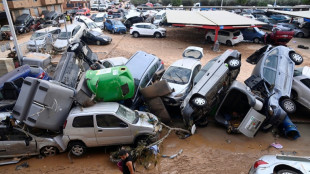
-
 Georgia says ruling party won disputed election, opposition calls protests
Georgia says ruling party won disputed election, opposition calls protests
-
US election, tech jitters rattle global stocks

-
 Tsitsipas keeps ATP Finals hopes alive with gritty Paris win
Tsitsipas keeps ATP Finals hopes alive with gritty Paris win
-
Turkey opposition protests at mayor's arrest for 'PKK ties'

-
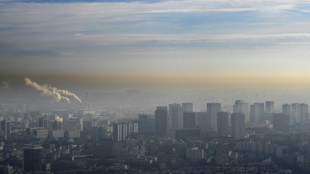 EU greenhouse gas emissions saw 'huge' drop in 2023
EU greenhouse gas emissions saw 'huge' drop in 2023
-
Beauden Barrett starts at fly-half for New Zealand against England

-
 Musk's millions: Five ways the world's richest man helps Trump
Musk's millions: Five ways the world's richest man helps Trump
-
Spain flood death toll soars to 158

-
 Harris, Trump head west in US election race countdown
Harris, Trump head west in US election race countdown
-
Amorim promises 'clarification' on Man Utd manager's job on Friday

-
 Macron to speak inside Notre Dame for cathedral reopening: archbishop
Macron to speak inside Notre Dame for cathedral reopening: archbishop
-
Man Utd target Amorim says no decision before Friday

-
 US Fed's favored inflation gauge cools in September
US Fed's favored inflation gauge cools in September
-
All Blacks coach Robertson defends haka after jibe from England's Marler

-
 French PM Barnier 'doing well' after operation
French PM Barnier 'doing well' after operation
-
Two children among three dead in Ukraine airstrike

-
 Nepal's day of the dog as part of Hindu celebrations
Nepal's day of the dog as part of Hindu celebrations
-
Not enough time in universe for monkeys to pen Shakespeare: study

-
 South Africa sweep Bangladesh series with crushing innings victory
South Africa sweep Bangladesh series with crushing innings victory
-
All Blacks recall big guns for England clash

-
 Musk to appear in court as part of Trump campaign suit
Musk to appear in court as part of Trump campaign suit
-
Sales slump 27% at carmaker Stellantis

-
 French PhD student held in Tunisia: supervisor
French PhD student held in Tunisia: supervisor
-
US envoys in Israel to seek Lebanon truce plan

-
 EU probes shopping app Temu over illegal products
EU probes shopping app Temu over illegal products
-
Spain mourns after historic floods kill 95

-
 New doubt over production cuts in plastic pollution treaty
New doubt over production cuts in plastic pollution treaty
-
Top MotoGP riders want Valencia race moved after deadly floods

-
 Yao Ming quits as head of China's basketball association
Yao Ming quits as head of China's basketball association
-
Eurozone inflation rebounds more than expected in October

-
 Man Utd set to announce Amorim as new manager
Man Utd set to announce Amorim as new manager
-
Hong Kong economic growth misses forecast in third quarter: data

-
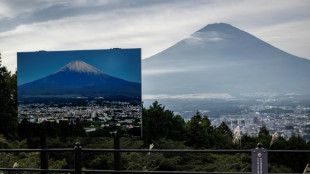 Snow forecast next week on Mt Fuji, at last
Snow forecast next week on Mt Fuji, at last
-
Faker: eSports legend and South Korea 'national treasure'

-
 Sho-time! Japan fans ecstatic as Ohtani becomes World Series champ
Sho-time! Japan fans ecstatic as Ohtani becomes World Series champ
-
90 Rohingya left 'stranded' on Indonesia beach

-
 As US election rhetoric heats up, illegal border crossings fall
As US election rhetoric heats up, illegal border crossings fall
-
Snooker legend Ronnie O'Sullivan granted residency in Hong Kong

-
 'We'll survive': Ukrainians on front brace for hard winter
'We'll survive': Ukrainians on front brace for hard winter
-
Lips, teeth and breasts: Albania cashes in on medical tourism

-
 Bangladesh 137-8 at lunch, trail by 438, as five-star Rabada strikes
Bangladesh 137-8 at lunch, trail by 438, as five-star Rabada strikes
-
Iannone to race at Malaysian MotoGP after four-year doping ban

-
 Russia stirs up anti-LGBTQ prejudice in Moldova 'information war'
Russia stirs up anti-LGBTQ prejudice in Moldova 'information war'
-
Germany to bury nuclear waste but toxic dispute unresolved
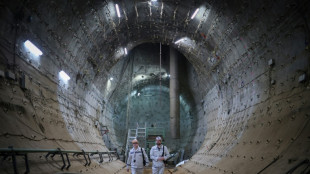
-
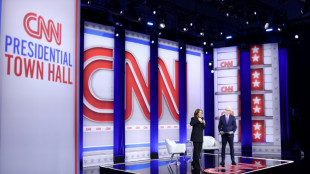 All eyes on US TV networks for 'high stakes' election night
All eyes on US TV networks for 'high stakes' election night
-
Bank of Japan warns of 'high uncertainties' after election

| RBGPF | -0.13% | 60.92 | $ | |
| RYCEF | -5.69% | 6.86 | $ | |
| CMSC | -0.07% | 24.572 | $ | |
| RELX | -1.42% | 46.255 | $ | |
| NGG | -1.92% | 63.845 | $ | |
| BTI | 1.38% | 34.84 | $ | |
| BP | 0.26% | 29.095 | $ | |
| RIO | -1.4% | 64.99 | $ | |
| VOD | -1.35% | 9.265 | $ | |
| SCS | -0.66% | 12.15 | $ | |
| GSK | -0.65% | 36.77 | $ | |
| CMSD | -0.24% | 24.77 | $ | |
| AZN | -1.69% | 71.62 | $ | |
| BCC | 0.37% | 134.87 | $ | |
| JRI | 0.5% | 13.115 | $ | |
| BCE | 0.11% | 32.274 | $ |
US, South Korea meet after North Korea fires most powerful ICBM
The United States and South Korea held high-level talks Thursday after North Korea test-fired one of its newest and most powerful missiles, demonstrating its threat to the US mainland days ahead of elections.
The weapons test was the first since North Korea was accused of sending troops to Russia to support the invasion of Ukraine, triggering alarm and warnings by Washington, Seoul and Europe.
North Korea's latest actions were certain to top the agenda as Secretary of State Antony Blinken and Defense Secretary Lloyd Austin opened previously scheduled joint talks with their South Korean counterparts in Washington.
South Korea, which previously said that the North was preparing a missile or even nuclear test ahead of US elections on Tuesday, said Pyongyang appeared to have fired a solid-propelled long-range ballistic missile.
It flew 1,000 kilometers (621 miles) after being fired on a lofted trajectory -- meaning up, not out, the South Korean military said.
Developing advanced solid-fuel missiles -- which are quicker to launch and harder to detect and destroy in advance -- has long been a goal for North Korean leader Kim Jong Un.
Kim called the sanctions-defying launch "an appropriate military action that fully meets the purpose of informing the rivals... of our counteraction will," according to the official Korean Central News Agency.
The test "updated the recent records of the strategic missile capability," of North Korea, the agency said, with Kim vowing his country "will never change its line of bolstering up its nuclear forces".
- Longest-ever launch -
Tokyo said that the "ICBM-class" missile had flown for longer than any other previously tested by the North, being airborne for about 86 minutes and hitting altitudes of 7,000 kilometers.
"We estimate that its flying altitude was the highest we have seen," Japanese Defense Minister Gen Nakatani told reporters.
Both the White House and UN Secretary-General Antonio Guterres said that the launch clearly violated UN Security Council resolutions.
The missile in theory could strike the mainland United States, although National Security Council spokesman Sean Savett said there was no immediate risk from the test-firing.
China, historically North Korea's closest ally, said it was "concerned about developments on the (Korean) peninsula" and urged a "political resolution" to the issue.
Seoul, Washington and Tokyo -- key regional security allies -- will respond with joint military drills involving US strategic assets, Seoul said.
South Korean President Yook Suk Yeol also said the country would "designate new independent sanctions" on the North and work with partners and the UN to penalize Pyongyang's "habitual violations of Security Council resolutions."
- Diverting attention? -
North Korea's missile launch "seems to have been carried out to divert attention from international criticism of its troop deployment," said Yang Moo-jin, president of the University of North Korean Studies in Seoul.
Seoul has long accused the nuclear-armed North of sending weapons to help Moscow fight Kyiv and alleged that Pyongyang has moved to deploy soldiers en masse in the wake of Kim Jong Un's signing of a mutual defense deal with Russian President Vladimir Putin in June.
Seoul has warned that Russia may be providing new technology or expertise to Pyongyang in return for weapons and troops to help them fight Ukraine.
It is possible "Russia actually provided new technology for reentering the atmosphere," said Ahn Chan-il, a defector-turned-researcher who runs the World Institute for North Korea Studies.
But it is more likely that Thursday's test was a bid to distract from the troop deployment and get "the world's attention ahead of the US presidential election," Ahn added.
Vice President Kamala Harris in a campaign rally Tuesday charged that Kim and Putin "are rooting" for her rival Donald Trump as he is "easy to manipulate with flattery and favor."
Trump as president met three times with Kim, unusually personal diplomacy that reduced tensions but did not yield a lasting agreement.
Seoul, a major weapons exporter, has said it is reviewing whether to send weapons directly to Ukraine in response to the North's troops, an idea it has previously resisted due to longstanding domestic policy that prevents it from sending weaponry into active conflicts.
North Korea has denied sending troops to Russia, but in the first comment in state media last week, its vice foreign minister said that if such a deployment were to happen, it would be in line with international law.
burs-sct/md
O.Gaspar--PC
